'You adapt or you die': College football coaches wrestle with changing NCAA landscape
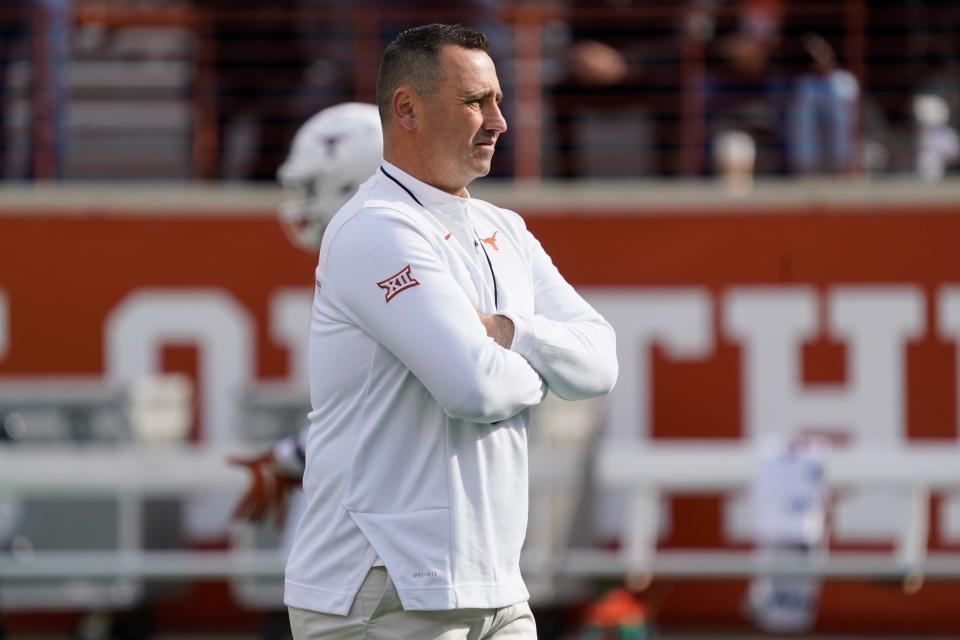
Standing in a Scottsdale hotel lobby, Steve Sarkisian used a five-word adage to explain how football teams can react to the sweeping changes taking place across college sports.
"You adapt or you die," said Sarkisian, Texas' head coach.
"If you don't adapt, I think you're gonna get swallowed up in this stuff," he added. "So we might as well embrace that change is happening. The genie is out of the bottle. It's probably not going back in."
As Sarkisian looks to write a new chapter of Texas football, matters such as name, image and likeness, the transfer portal, conference re-alignment and future media contracts are creating a new landscape in college athletics.
These topics, as well as others including recruiting changes and compliance, were discussed this week in Scottsdale as coaches, athletic directors, commissioners and other representatives from the Pac-12, Big Ten, Big 12 and Mountain West took part in conference meetings.
While the Big 12's meeting contained more discussions than decisions, according to Oklahoma State head coach Mike Gundy, important perspectives were shared between leagues to help chart the future for them and their teams.
"It was a lot of great conversations," Arizona head coach Jedd Fisch told the Republic. "We got some really smart head coaches in there that had been around a long time, that had heard a lot and seen how things have gotten. They've been able to help."
Over the past two days, the Republic spoke with multiple attendees at the Scottsdale meetings regarding the top issues facing college sports and the path forward.
"Just to be a part of one of the most historical programs in college football history and being a part of one of the biggest transitions in college football history... it's incredibly, incredibly exciting," Oklahoma head coach Brent Venables said. "Just a real historical opportunity."
Name, image and likeness
Since the Supreme Court ruled against the National Collegiate Athletic Association in June, college athletes have reaped the benefits of NIL rights, while collectives — organized by third parties to help coordinate NIL deals — are popping up at universities across the country, and on the recruiting trail.
Indiana head coach Tom Allen said high school prospects are asking about the policy and opportunities available in Bloomington.
"It's become a variable when a kid makes a decision," Allen said. "But if that's the first thing they're asking for, to me, that goes back to fit. That doesn't line up with what I believe in.
"So now, do you need to take full advantage? Oh absolutely. I'm not naive to that."
NIL has certainly allowed for lucrative agreements, as The Athletic reported in March that a five-star recruit in the Class of 2023 signed an NIL deal with a school's collective worth $8 million. It is also being used as a tool in player movement.
When asked about an article from 247 Sports that Longhorns wide receiver Xavier Worthy was offered a six-figure opportunity to depart Texas for another program, Sarkisian said, "We were well aware that that was probably going to come to play," and that foresight and thinking ahead are key in these situations.
Worthy is remaining at Texas, according to 247 Sports' Jeff Howe.
"How are you gonna be able to limit anything?" said Todd Berry, executive director of the American Football Coaches Association. "This is what we said from day one. You start going down this road without any guardrails, which they didn't, and obviously the courts have already ruled on it. And so consequently, there is nothing that anybody can do about NIL because it's not like a product or service."
Some protocols might be in the works. Sports Illustrated reported that a task force including university administrators is preparing policies to prevent boosters and booster-led collectives from impacting recruiting.
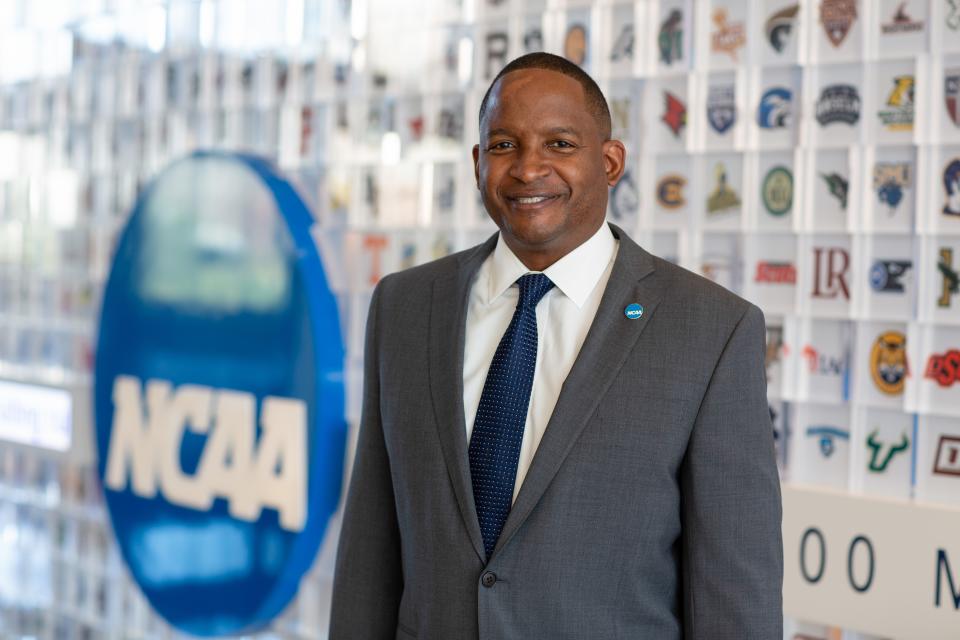
Additionally, the Big Ten's coaches and athletic directors met Wednesday to try and create base guidelines. Northwestern athletic director Derrick Gragg said those present "want to lead with integrity first," and part of the discussion touched on possible NCAA decisions on NIL in the future.
Gragg, a former NCAA executive who has been a compliance director at three Power Five institutions, said a priority of the meeting was to make sure that NIL opportunities being provided are not violating NCAA rules.
"As a former student-athlete on this level, I am fully supportive of anything that helps our student athletes. We need to continue to do more for them," Gragg said. But this issue has quickly morphed into something that we did not want it to become.
"So it's gone (to) a pay-for-play model. That is No. 1 supposed to be against the rules, and so we just want to make sure that all of our schools have the basic knowledge and the understanding of the rules and what is supposed to be done (and) what is proper."
The transfer portal
As the Hoosiers' head coach, Allen has instituted the motto Love Each Other, also known as LEO, within the program.
It is a reflection of what Allen views as some of the key tenets of a team's success: players caring about one another and working together for the betterment of a group.
He will attempt to build that mentality once again, as Indiana added more than 10 players from the transfer portal, including Missouri quarterback Connor Bazelak.
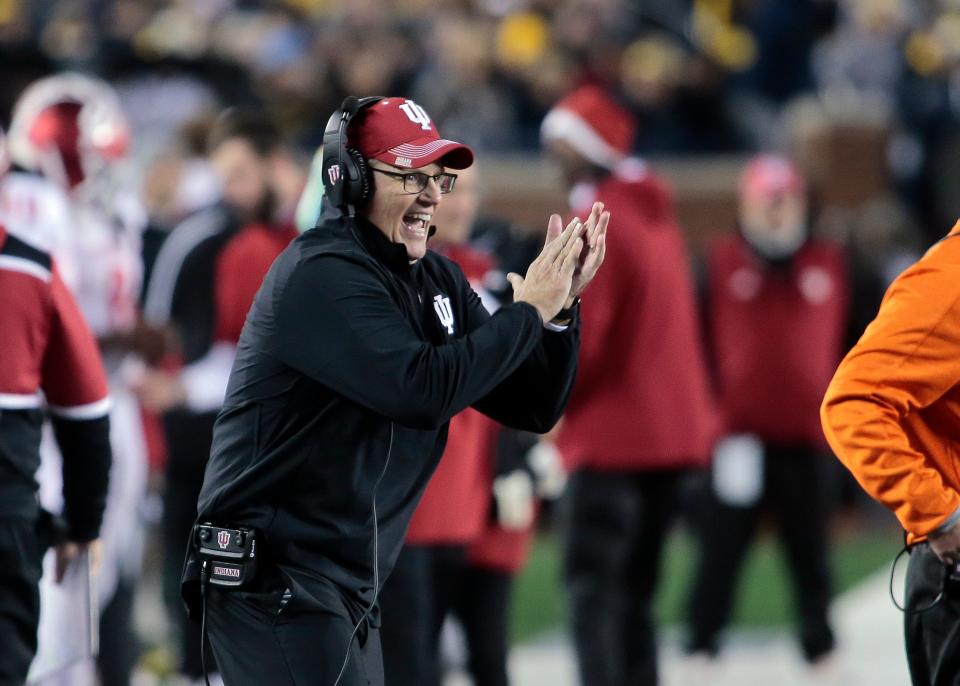
"It still goes back to fit to me when you take a guy from the portal or you take him out of high school," Allen said. "We still want to be true to our high school base in how we build our roster, but we've definitely expanded the use of the portal here."
CBS Sports reported that more than 2,000 players entered the transfer portal this academic year. According to Baylor head coach Dave Aranda, a beneficial way to navigate the main matters facing college sports, including the transfer portal and NIL, is to think of players as people.
An AFCA recommendation may help achieve that goal. ESPN reported that the organization is looking to institute a transfer window in the fall and the spring.
Berry told the Republic the idea was introduced four years ago and can help control the "free for all" that occurred in the portal, whose deadline to enter passed on May 1. He added that the new system would be better for student-athletes and universities.
"Creating a window to where all of a sudden it's not an ongoing thing because it's not fair to the student-athlete," Berry said. "They're trying to make a decision. ... What we're seeing right now is because it's open all the time, then if I'm a student-athlete and I'm saying, 'I want to ... play quarterback,' I want to see who else is in the portal at that point in time to see if I want to get in the portal. Right now, they don't have that ... they don't have a window."
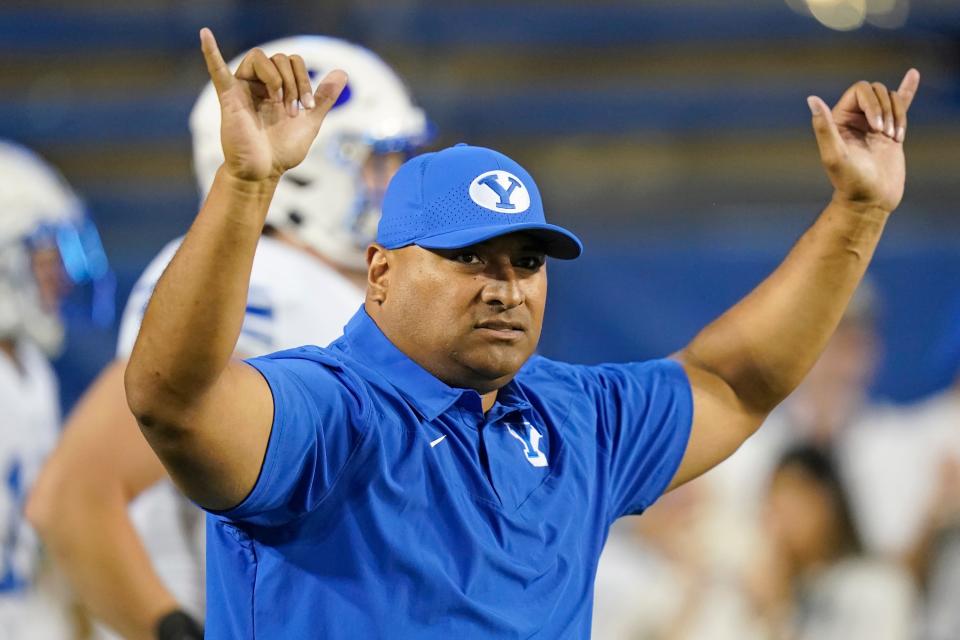
Fresh off a 10-3 season, BYU head coach Kalani Sitake said the Cougars "have the honor" of taking guidelines on what is allowed in college sports and applying it to "what we think would be best" for the program and student-athletes.
Regarding the portal, Sitake said he will listen to rulings from entities including the NCAA and the Big 12, adjust and try to find a way to make it work within BYU's program, culture and university community.
Conference re-alignment
Even though Texas and Oklahoma sent shockwaves through college athletics last summer when they announced their departure to the SEC by 2025, coaches from both programs were in attendance in Scottsdale this week
"At the end of the day, we're in the Big 12," Sarkisian said. "It's important to know the direction of the conference, the direction of college football and where we're going on a lot of these topics. And so, to be able to sit in and hopefully offer some opinions that prompt some thought, I think is a positive."
The Big 12's meeting touched on topics including NIL and the transfer portal, as well as potential recruiting changes and compliance, according to Gundy, who along with other coaches expressed excitement for the four future members of the conference: BYU, Cincinnati, Houston and UCF.
The Cougars are joining the Big 12 next season, while Brett McMurphy of The Action Network reported that the other three schools are hoping to depart the American Athletic Conference in 2023 for a settlement between $17 and $20 million.
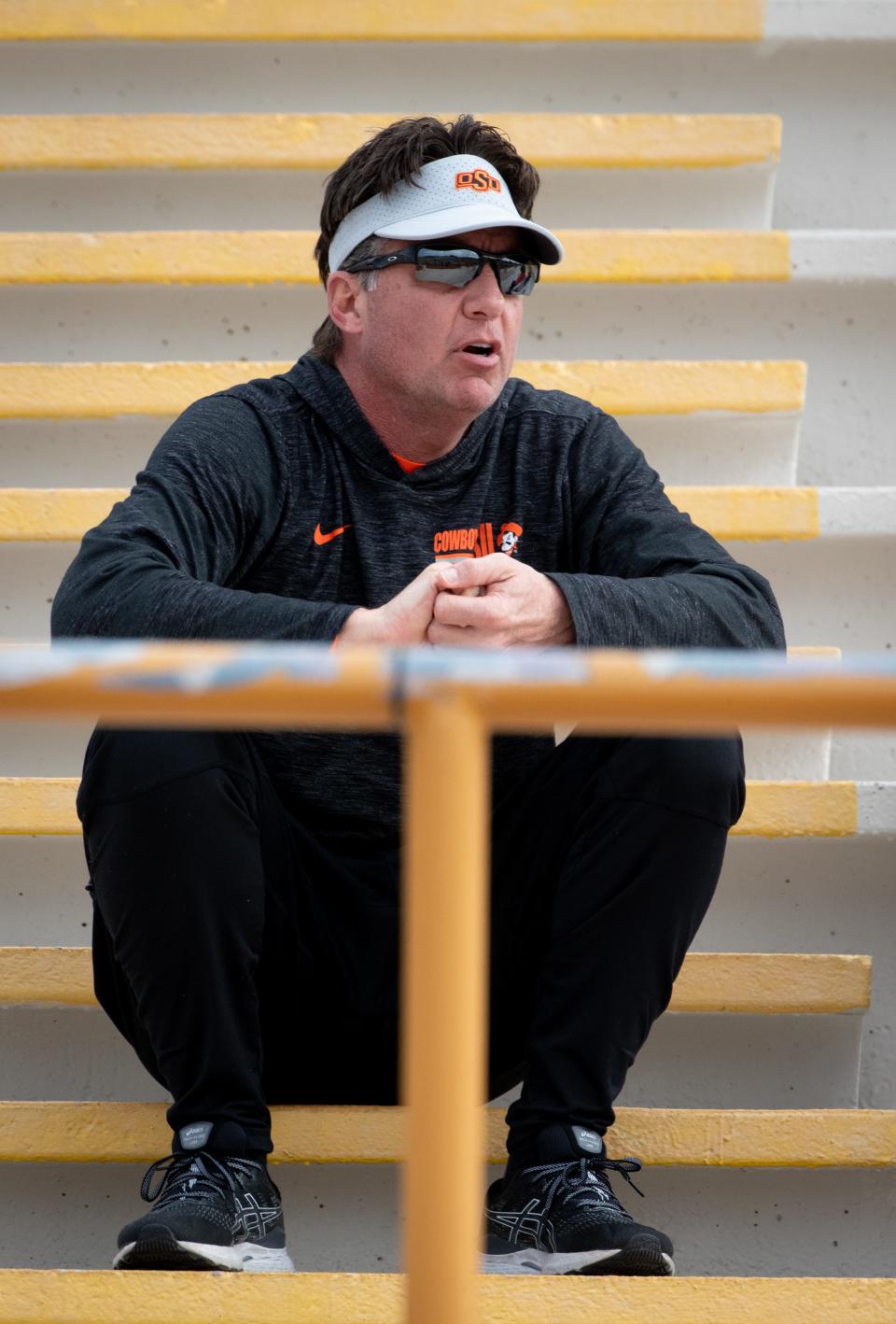
Even though Gundy said there is currently uncertainty regarding conference re-alignment and that it is "very turbulent," he believes the Big 12's new programs will be an asset for the league in terms of athletic success and strong television markets located in populated areas.
This runs both ways, as the impact of the Cougars' future move is already being felt in Provo.
"We've felt like the goal is to always try to operate like a Power 5 program," Sitake said. "We don't play in the Big 12 until 2023, so we're focused on this season, but it's really helped quite a bit in the fact of recruiting and just being a part of this partnership. It's huge for our program."
The Big 12 is going through additional transition, as commissioner Bob Bowlsby is stepping down this year. Bowlsby, who helped navigate the conference through the loss of the Red River Rivalry schools and the four new additions, was in Scottsdale this week and numerous coaches praised his work and dedication.
"There's a lot of change going on, as much as there's ever been," Venables said, adding he's been a great help. "Just has a great voice and a lot of wisdom. He's been a great leader."
Television contracts
On Tuesday, Big Ten commissioner Kevin Warren told CBS Sports that the conference is hoping to agree on a new media rights contract in nearly a month as it approaches the end of a six-year, $2.65 billion deal.
"Fortunately, there's a lot of media interest, but it'll probably be a while before we see it all shake out," Iowa athletic director Gary Barta said. "But between Fox and CBS and ESPN and BTN, our current partners, it's exciting to be talking to some others."
Barta, who previously chaired the College Football Playoff Selection Committee, complemented the Big Ten's current television partners while acknowledging the current strength of the media market. Meanwhile, Gragg said the conversations surrounding the future media agreement are promising and he's encouraged by what he is learning.
The Big Ten isn't alone, as the Pac-12 and Big 12 have media rights contracts expiring in 2024 and 2025, respectively.
This article originally appeared on Arizona Republic: 'Genie is out of the bottle:" College coaches, ADs navigate new world

